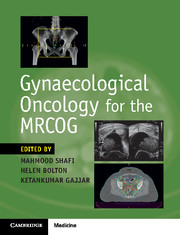Book contents
- Gynaecological Oncology for the MRCOG
- Gynaecological Oncology for the MRCOG
- Copyright page
- Dedication
- Contents
- Contributors
- Preface
- Abbreviations
- 1 Epidemiology of Gynaecological Cancers
- 2 Pathology of Gynaecological Cancers
- 3 Imaging in Gynaecological Oncology
- 4 Concepts of Treatment Approaches in Gynaecological Oncology
- 5 Radiation Therapy for Gynaecological Malignancies
- 6 Systemic Therapy in Gynaecological Cancers
- 7 Preinvasive Disease, Screening and Hereditary Cancer
- 8 Surgical Principles in Gynaecological Oncology
- 9 Role of Laparoscopic Surgery
- 10 Ovarian, Fallopian Tube and Primary Peritoneal Cancer (including Borderline)
- 11 Endometrial Cancer
- 12 Cervical and Vaginal Cancer
- 13 Vulval Cancer
- 14 Uterine Sarcomas
- 15 Non-epithelial Ovarian Tumours and Gestational Trophoblastic Neoplasia
- 16 Palliative Care
- 17 Living with Cancer
- 18 Communication in Gynaecological Oncology
- Appendix
- Index
Preface
Published online by Cambridge University Press: 14 April 2018
- Gynaecological Oncology for the MRCOG
- Gynaecological Oncology for the MRCOG
- Copyright page
- Dedication
- Contents
- Contributors
- Preface
- Abbreviations
- 1 Epidemiology of Gynaecological Cancers
- 2 Pathology of Gynaecological Cancers
- 3 Imaging in Gynaecological Oncology
- 4 Concepts of Treatment Approaches in Gynaecological Oncology
- 5 Radiation Therapy for Gynaecological Malignancies
- 6 Systemic Therapy in Gynaecological Cancers
- 7 Preinvasive Disease, Screening and Hereditary Cancer
- 8 Surgical Principles in Gynaecological Oncology
- 9 Role of Laparoscopic Surgery
- 10 Ovarian, Fallopian Tube and Primary Peritoneal Cancer (including Borderline)
- 11 Endometrial Cancer
- 12 Cervical and Vaginal Cancer
- 13 Vulval Cancer
- 14 Uterine Sarcomas
- 15 Non-epithelial Ovarian Tumours and Gestational Trophoblastic Neoplasia
- 16 Palliative Care
- 17 Living with Cancer
- 18 Communication in Gynaecological Oncology
- Appendix
- Index
Summary
Women with gynaecological cancers are managed by multidisciplinary teams, with many professionals from different backgrounds contributing to patients’ health care. As outcomes for patients continue to improve, there has been a shift towards understanding survivorship issues and tailoring treatments to achieve the best possible outcomes while minimising the impact of treatment on quality of life. This book addresses all aspects of caring for women with gynaecological malignancy, covering general topics as well as specific issues faced by patients.
This book is aimed at trainees in gynaecology and oncology and at consultants with a special interest in gynaecological cancers. Although this book covers the syllabus for the MRCOG examination, it is also written to provide a comprehensive foundation for all healthcare professionals caring for women with gynaecological cancers, beyond the basics. Allied medical staff, palliative care professionals and nurse specialists will also find this book a useful resource for up-to-date information on the whole range of gynaecological cancers.
Chapters 1–9 and 16–18 cover the broad issues in gynaecological oncology whereas Chapters 10–15 cover site-specific tumours. The chapters are intended to be clinically focused and are based upon published facts. Wherever possible, the reader is directed to national guidelines and standards. Boxed information, key facts and tips are highlighted to assist the reader. Each chapter lists further reading recommendations to guide the interested reader to seek further information about the topics covered in the chapter.
We have had the pleasure of working with experts who have kindly contributed to this book. This is always one of the nicest aspects of writing a book in that there is collaboration with colleagues and friends whom we admire and respect for their expertise.
- Type
- Chapter
- Information
- Gynaecological Oncology for the MRCOG , pp. xi - xiiPublisher: Cambridge University PressPrint publication year: 2018

